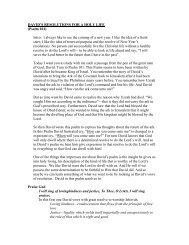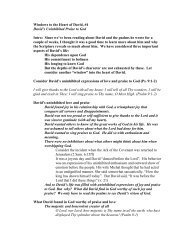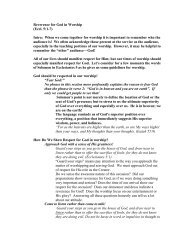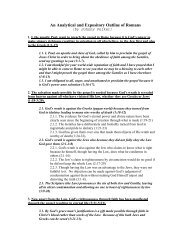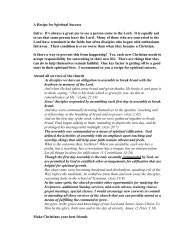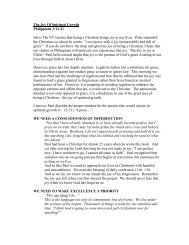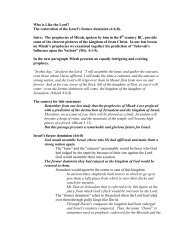“Sharers in the Altar” (1 Cor. 10:18) Intro: I think ... - Truth Chasers
“Sharers in the Altar” (1 Cor. 10:18) Intro: I think ... - Truth Chasers
“Sharers in the Altar” (1 Cor. 10:18) Intro: I think ... - Truth Chasers
Create successful ePaper yourself
Turn your PDF publications into a flip-book with our unique Google optimized e-Paper software.
<strong>“Sharers</strong> <strong>in</strong> <strong>the</strong> <strong>Altar”</strong><br />
(1 <strong>Cor</strong>. <strong>10</strong>:<strong>18</strong>)<br />
<strong>Intro</strong>: I th<strong>in</strong>k every time I read <strong>the</strong> OT, especially Leviticus I repeatedly thank<br />
God that I don’t live under <strong>the</strong> old covenant. Maybe you too wonder how you<br />
would be able to get through <strong>the</strong> maze of <strong>in</strong>structions about what sacrifices<br />
should be offered, when, and how. Of course, God’s people had <strong>the</strong> help of His<br />
priests to teach <strong>the</strong>m <strong>the</strong>se th<strong>in</strong>gs.<br />
But even though we no longer offer <strong>the</strong>m, it is good to know about <strong>the</strong>m; because<br />
our knowledge of <strong>the</strong>m can give us <strong>in</strong>sight <strong>in</strong>to what we do as well. Consider for<br />
example <strong>the</strong> words of Paul to <strong>the</strong> <strong>Cor</strong><strong>in</strong>thians:<br />
Look at <strong>the</strong> nation Israel; are not those who eat <strong>the</strong> sacrifices sharers <strong>in</strong> <strong>the</strong> altar? (1<br />
<strong>Cor</strong><strong>in</strong>thians <strong>10</strong>:<strong>18</strong>)<br />
Paul refers to <strong>the</strong> Israelite’s practice as a basis for <strong>in</strong>struction to Christians. But<br />
what is Paul speak<strong>in</strong>g of and what is <strong>the</strong> message for us today?<br />
The Sacrifices of <strong>the</strong> “Nation of Israel”<br />
This week <strong>in</strong> our Bible read<strong>in</strong>g we’ve read a lot about sacrifices. We<br />
learned that <strong>the</strong>re were many k<strong>in</strong>ds and that <strong>the</strong>re were very detailed<br />
<strong>in</strong>structions given about what k<strong>in</strong>d of animal to offer, how it was to be<br />
prepared, and for what purpose it was to be sacrificed.<br />
Paul <strong>in</strong> our text refers to one particular class of offer<strong>in</strong>gs. These were<br />
sacrifices eaten by <strong>the</strong> Israelites.<br />
Most of us when we th<strong>in</strong>k of sacrifices <strong>in</strong> <strong>the</strong> OT would probably<br />
picture someth<strong>in</strong>g like this: An Israelite person br<strong>in</strong>gs an animal to <strong>the</strong><br />
tabernacle, he hands it over to <strong>the</strong> priest, <strong>the</strong> priest cuts its throat<br />
shedd<strong>in</strong>g its blood until it dies. Then it is hoisted onto <strong>the</strong> altar and<br />
consumed <strong>in</strong> <strong>the</strong> fire while <strong>the</strong> worshipper goes on his way.<br />
However from our read<strong>in</strong>g this week we were able to see that some of<br />
<strong>the</strong> offer<strong>in</strong>gs were not completely burnt on <strong>the</strong> altar, but <strong>in</strong>stead a<br />
portion was reserved from <strong>the</strong>m for <strong>the</strong> priests and for <strong>the</strong> worshippers<br />
and <strong>the</strong>y were “eaten” <strong>the</strong>re before <strong>the</strong> Lord.<br />
In o<strong>the</strong>r words, connected with <strong>the</strong> altar was a “table”.<br />
These offer<strong>in</strong>gs were called “peace offer<strong>in</strong>gs”.<br />
The Hebrew words for <strong>the</strong>m is “shelem” and appears to be related <strong>the</strong><br />
Hebrew greet<strong>in</strong>g “shalom” which means peace.<br />
Thus one might see <strong>the</strong>se offer<strong>in</strong>gs as <strong>in</strong>dications of a peaceful<br />
relationship with God and were offered out of gratitude for God’s<br />
bless<strong>in</strong>gs or to fulfill a vow made to Him <strong>in</strong> connection with a<br />
bless<strong>in</strong>g.<br />
These offer<strong>in</strong>gs were to be eaten “<strong>in</strong> <strong>the</strong> presence of <strong>the</strong> Lord with joy”.<br />
“But you shall eat <strong>the</strong>m before <strong>the</strong> Lord your God <strong>in</strong> <strong>the</strong> place which<br />
<strong>the</strong> Lord your God will choose, you and your son and daughter, and
your male and female servants, and <strong>the</strong> Levite who is with<strong>in</strong> your<br />
gates; and you shall rejoice before <strong>the</strong> Lord your God <strong>in</strong> all your<br />
undertak<strong>in</strong>gs. (Deuteronomy 12:<strong>18</strong>)<br />
And as this text also <strong>in</strong>dicates along with <strong>the</strong> <strong>in</strong>structions <strong>the</strong>y must be<br />
entirely consumed <strong>in</strong> ei<strong>the</strong>r a s<strong>in</strong>gle day or <strong>in</strong> a couple of days. This<br />
supplied motivation for <strong>the</strong> worshipper to share <strong>the</strong> offer<strong>in</strong>gs with<br />
o<strong>the</strong>rs and toge<strong>the</strong>r rejoice.<br />
Consequently all those who ate of <strong>the</strong> sacrifice toge<strong>the</strong>r were said to be<br />
“sharers <strong>in</strong> <strong>the</strong> altar”. That expression suggested<br />
Shar<strong>in</strong>g <strong>in</strong> <strong>the</strong> altar highlighted <strong>the</strong> importance of serv<strong>in</strong>g God alone<br />
and no o<strong>the</strong>r god.<br />
Shar<strong>in</strong>g <strong>in</strong> <strong>the</strong> altar highlighted <strong>the</strong> unity of God’s people as a spiritual<br />
family.<br />
Shar<strong>in</strong>g <strong>in</strong> <strong>the</strong> altar highlight <strong>the</strong> bless<strong>in</strong>g of be<strong>in</strong>g <strong>in</strong> covenant with<br />
God.<br />
The Sacrifice of <strong>the</strong> New Israel, <strong>the</strong> church<br />
Just as <strong>the</strong> Israelites had an “altar” and a “table”, so we too have an altar<br />
and a table.<br />
Our “altar” is <strong>the</strong> Lord’s sacrifice.<br />
Our “table” is <strong>the</strong> Lord’s Supper.<br />
Paul <strong>in</strong> 1 <strong>Cor</strong>. <strong>10</strong> uses <strong>the</strong> peace offer<strong>in</strong>gs of <strong>the</strong> ancient Israelites to<br />
teach <strong>the</strong> <strong>Cor</strong><strong>in</strong>thians about <strong>the</strong> Lord’s Supper and its implications for<br />
<strong>the</strong> believer’s life.<br />
Just as <strong>the</strong> Israelites were sharers <strong>in</strong> <strong>the</strong> altar when <strong>the</strong>y ate of <strong>the</strong><br />
sacrifice, so we too are “sharers <strong>in</strong> <strong>the</strong> altar” when we partake of <strong>the</strong> Lord’s<br />
Table.<br />
Is not <strong>the</strong> cup of bless<strong>in</strong>g which we bless a shar<strong>in</strong>g <strong>in</strong> <strong>the</strong> blood of<br />
Christ? Is not <strong>the</strong> bread which we break a shar<strong>in</strong>g <strong>in</strong> <strong>the</strong> body of<br />
Christ? (1 <strong>Cor</strong>. <strong>10</strong>:16)<br />
Of course, <strong>the</strong> sacrifice that Jesus made for us was his life. Thus, we<br />
can no longer eat <strong>the</strong> sacrifice itself. Instead Jesus, <strong>in</strong> keep<strong>in</strong>g with <strong>the</strong><br />
OT imagery, took bread and fruit of <strong>the</strong> v<strong>in</strong>e and made <strong>the</strong>m<br />
representatives of His sacrifice.<br />
This is my body<br />
This is my blood<br />
Thus when we eat of <strong>the</strong> Lord’s Supper we are “shar<strong>in</strong>g <strong>in</strong> <strong>the</strong> body<br />
and blood of <strong>the</strong> Lord”, not <strong>in</strong> <strong>the</strong> Roman Catholic sense of<br />
“transubstantiation”, but <strong>the</strong> spiritual sense that <strong>the</strong> bread and fruit of<br />
<strong>the</strong> v<strong>in</strong>e are memorials of Jesus.<br />
Our common share <strong>in</strong> <strong>the</strong> sacrifice of Christ calls attention to our<br />
“oneness” <strong>in</strong> Christ!<br />
S<strong>in</strong>ce <strong>the</strong>re is one bread, we who are many are one body; for we all<br />
partake of <strong>the</strong> one bread. (1 <strong>Cor</strong><strong>in</strong>thians <strong>10</strong>:17)<br />
The <strong>Cor</strong><strong>in</strong>thians were miss<strong>in</strong>g <strong>the</strong> unity implied by <strong>the</strong> table of <strong>the</strong><br />
Lord.
They were divided around men.<br />
For I have been <strong>in</strong>formed concern<strong>in</strong>g you, my brethren, by<br />
Chloe’s people, that <strong>the</strong>re are quarrels among you. Now I<br />
mean this, that each one of you is say<strong>in</strong>g, “I am of Paul,” and<br />
“I of Apollos,” and “I of Cephas,” and “I of Christ.” (1 <strong>Cor</strong>.<br />
1:11-12)<br />
They were divided sociologically.<br />
Therefore when you meet toge<strong>the</strong>r, it is not to eat <strong>the</strong> Lord’s<br />
Supper, for <strong>in</strong> your eat<strong>in</strong>g each one takes his own supper first;<br />
and one is hungry and ano<strong>the</strong>r is drunk. (1 <strong>Cor</strong><strong>in</strong>thians 11:20-<br />
21)<br />
Every time we break bread we should remember that every person<br />
partak<strong>in</strong>g is a “sharer <strong>in</strong> <strong>the</strong> sacrifice”. This is reason enough to put<br />
away all social dist<strong>in</strong>ctions and love each o<strong>the</strong>r and work toge<strong>the</strong>r!<br />
The reason we are one is because Christ died for each of us!<br />
Our common share <strong>in</strong> <strong>the</strong> sacrifice of Christ calls attention to our exclusive<br />
devotion to Jesus and no o<strong>the</strong>r!<br />
Paul’s primary concern at <strong>Cor</strong><strong>in</strong>th was that <strong>the</strong> <strong>Cor</strong><strong>in</strong>thians had<br />
managed to conv<strong>in</strong>ce <strong>the</strong>mselves that <strong>the</strong>y could partake of <strong>the</strong> Lord’s<br />
Table and <strong>the</strong>n visit <strong>the</strong> idolatrous temples and partake of <strong>the</strong> meals<br />
that were served <strong>the</strong>re <strong>in</strong> honor of <strong>the</strong> gods. No rationalization like,<br />
“but those gods are not real” would do! There was a reality beh<strong>in</strong>d<br />
those sacrifices:<br />
What do I mean <strong>the</strong>n? That a th<strong>in</strong>g sacrificed to idols is anyth<strong>in</strong>g, or<br />
that an idol is anyth<strong>in</strong>g? No, but I say that <strong>the</strong> th<strong>in</strong>gs which <strong>the</strong><br />
Gentiles sacrifice, <strong>the</strong>y sacrifice to demons, and not to God; and I do<br />
not want you to become sharers <strong>in</strong> demons. (1 <strong>Cor</strong><strong>in</strong>thians <strong>10</strong>:19-20)<br />
The bottom l<strong>in</strong>e for <strong>the</strong> <strong>Cor</strong><strong>in</strong>thians was:<br />
You cannot dr<strong>in</strong>k <strong>the</strong> cup of <strong>the</strong> Lord and <strong>the</strong> cup of demons; you<br />
cannot partake of <strong>the</strong> table of <strong>the</strong> Lord and <strong>the</strong> table of demons. Or do<br />
we provoke <strong>the</strong> Lord to jealousy? We are not stronger than He, are<br />
we? (1 <strong>Cor</strong><strong>in</strong>thians <strong>10</strong>:21-22)<br />
Thus, our participation <strong>in</strong> <strong>the</strong> Lord’s Supper is a pledge that we will<br />
keep our covenant promises to serve <strong>the</strong> Lord alone and put Him first<br />
<strong>in</strong> our lives.<br />
And one f<strong>in</strong>al po<strong>in</strong>t that is not formally made <strong>in</strong> this text:<br />
Our common share <strong>in</strong> <strong>the</strong> sacrifice of Christ should cause us to live with<br />
joy and thanksgiv<strong>in</strong>g.<br />
It is <strong>in</strong>terest<strong>in</strong>g to note <strong>the</strong> way <strong>the</strong> early church referred to <strong>the</strong> Lord’s<br />
Supper. They called it “<strong>the</strong> Eucharist”. Eucharist is just a form of <strong>the</strong><br />
Greek word, eucharisteo, used to describe what Jesus did after<br />
break<strong>in</strong>g <strong>the</strong> bread. He gave thanks!<br />
Everett Ferguson makes this <strong>in</strong>terest<strong>in</strong>g observation:<br />
“The Lord’s Supper was <strong>the</strong> church’s great moment of thanksgiv<strong>in</strong>g.<br />
The church’s basic act of prayer and worship was to give thanks. That<br />
says someth<strong>in</strong>g significant about <strong>the</strong> church life of <strong>the</strong> early Christians
and <strong>the</strong> quality of <strong>the</strong>ir life <strong>in</strong> Christ. Hence, <strong>in</strong> <strong>the</strong> prayers at <strong>the</strong><br />
Lord’s table <strong>the</strong>re was a remembrance of all of God’s gifts. But<br />
preem<strong>in</strong>ently <strong>the</strong> Eucharist was centered on <strong>the</strong> spiritual bless<strong>in</strong>gs<br />
which came through Jesus Christ”. (Early Christians Speak, p. 96).<br />
Is this aspect of our observance miss<strong>in</strong>g?<br />
Sure, <strong>the</strong>re may be reason for soberness when we realize <strong>the</strong><br />
awesome consequences of not “judg<strong>in</strong>g <strong>the</strong> body rightly”.<br />
There may be sadness <strong>in</strong> <strong>the</strong> realization that our s<strong>in</strong>s sent Jesus<br />
to <strong>the</strong> cross.<br />
It is not a happy experience to remember all that Jesus suffered.<br />
But should we stop <strong>the</strong>re? Should we not also remember that<br />
all of it occurred because of God’s great love for us?<br />
And should we not also remember that because of that<br />
sacrifice we are be<strong>in</strong>g accepted by God? And that we are at<br />
peace with Him?<br />
Our table also, like <strong>the</strong> peace offer<strong>in</strong>gs of <strong>the</strong> OT, is a rem<strong>in</strong>der of <strong>the</strong><br />
covenant bless<strong>in</strong>gs we have <strong>in</strong> God! It is reason to rejoice and give<br />
thanks!<br />
Conclusion: So I’m glad that Christ has come and given Himself as <strong>the</strong><br />
sufficient and f<strong>in</strong>al sacrifice for our s<strong>in</strong>s. I am glad that I don’t have to keep up<br />
with all those offer<strong>in</strong>gs and offer <strong>the</strong>m. But it is good to remember that <strong>the</strong>re is<br />
a sacrifice that we too offer:<br />
I urge you <strong>the</strong>refore, brethren, by <strong>the</strong> mercies of God, to present your bodies a liv<strong>in</strong>g<br />
and holy sacrifice, acceptable to God, which is your spiritual service of worship.<br />
(Romans 12:1)<br />
Every day our lives should <strong>in</strong>dicate through this liv<strong>in</strong>g and holy sacrifice, <strong>the</strong> joy<br />
and <strong>the</strong> gratitude we feel for what Jesus did for us!



